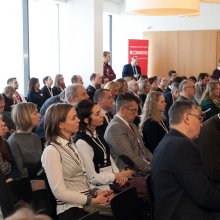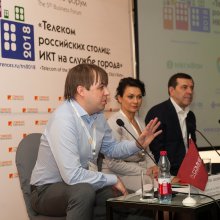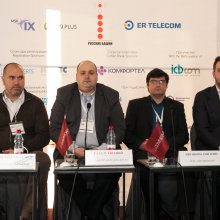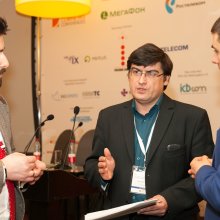About the event
“Smart City” has cleared up
The business forum “Telecom of the Russian Capitals: ICT on the city’s duty” was held on February 21, 2018 in Azimut hotel, St. Petersburg. The event was attended by 230 professionals that was 30% more than the organizer – COMNEWS information group – supposed. The representatives of governments and administrations of many Russian cities, energy distribution companies and other utilities, vendors of electronic metering devices, regional and federal telecom operators, developers and integrators of digital solutions, and also industry media and experts participated in the forum.
The general partner of the forum “Telecom of the Russian Capitals: ICT on the city’s duty” was MegaFon company, the infrastructural partner was Rostelecom company, and the partners of the forum were MSK-IX, Russian Towers Group and ER-Telecom Holding. The registration sponsors were the National Research and Development Institute of Technologies and Communications (NIITS) and VAS Experts company (SKAT DPI). The coffee break sponsor was Comfortel, and the event was held with the participation of LLC ICBCOM and LLC LifeStream (Smotreshka).
The Forum was endorsed by the Club of IT managers of the Central Federal District, the Association of Centers of Emergency Monitoring and Forecasting and Duty Dispatcher Services (the AMEDS Association) and the International Telecommunications Academy (MAC).
The forum was held for the fifth time, but in 2018 it expanded significantly its geography (to all regions and capitals of Russian regions). Moreover, this year the forum was focused on the topic of the Smart City and was devoted to the mutual search of tasks and opportunities by three parties of the process: representatives of the major Russian cities and regions authorities, telecommunications operators, and digital solutions providers.
Within the forum the operator companies were positioned not as providers of traditional communication services, but as the owners of digital infrastructure indispensable for creating the Smart City. It is no coincidence that Felix Kasatkin, the director of SPb GUP “ATS Smolny”, speaking at the plenary session, compared digital infrastructure and technologies with the house foundation, without which the house is unlikely to be solid (although the awards are given to the architects for the facades , while the foundation builders remain usually behind the scene).
The forum showed that the question of creating Smart City in Russia is ripe, but meantime the process is at the early stage. Just in 2017 several Russian cities (among which are St. Petersburg, Sevastopol and Sochi) created the Smart City programs and project offices. Almaz Valiullin, CEO of Information Technologies Center of the Republic of Tatarstan, said: “While we do not have a packaged solution of Smart City or Smart Region, projects in certain fields and cities are progressively going to become a single solution that will be helpful to citizens”. Among such projects, Almaz Valiullin named the state information system (SIS) “People’s Inspector” and SIS “People’s Control”, as well as the resident card. According to him, Tatarstan authorities launched the pilot project “Card of the resident” in Zelenodolsk city with 100.000 inhabitants, and 50% of adult population there received already these cards providing access to medical, transport, and banking services.
Anatoly Kotov, Special Representative of the Governor of St. Petersburg on Economic Development and Deputy Head of “Smart St. Petersburg” project office, said that the project office creates a register of smart city projects: a database that contains up-to-date information on future developments and technologies in the field of urban tasks. The priorities of “Smart St. Petersburg” project office are security, improving the quality of city authorities decisions, health care, transport, housing and utilities, and resource saving. The first phase of the projects selected by the office includes 40 initiatives. According to Anatoly Kotov, the city is ready to invest in infrastructure projects, while the implementation of other projects will be coordinated with business interests or public-private partnership.
Representatives of many cities and regions noted that at this moment there is no single understanding of what Smart City is. “As a matter of fact, in the state “Digital Economy” program there is no regional component, and every region, every municipality is looking for itself”, said Anatoly Dyubanov, Head of Department of Information and Telecommunication Technologies of the Novosibirsk Region. At the same time he noted that the Novosibirsk region had become a pioneer in Russia because the “Program of the oblast economy reindustrialization until 2025” was adopted there as early as 2016, and the Smart City projects take this document as point of departure.
The Head of “Smart Sevastopol” priority project of Sevastopol city Economic Development Department, Peter Darichev said: “Smart City is a new quality of life, but there is no common understanding on this topic yet. Perhaps, it was the reason why the Ministry of Communications removed the chapter “Smart City” from the final version of the “Digital Economy” program.
Andrey Karasev, Head of the Department of Informatization and Communication of the Krasnoyarsk city Administration, is in good spirits about the situation: “Smart City projects will certainly take place since they come from below: business initiates them actively. Technologies enter into life, change the urban environment, and the state, in fact, is catching up with this situation and trying to lead the process”. Also Andrey Karasev believes that Smart City cannot be created without communication infrastructure. One of the projects to this end was Street Wi-Fi: it allowed to attract eight Internet providers that provide free of charge access services in more than 200 public places of Krasnoyarsk city. A new initiative of Krasnoyarsk Department of Informatization and Communication is transferring the “last mile” in residential buildings from the operator’s responsibility to the management company. These steps became part of the work that took Krasnoyarsk to the fifth place in the rating of Smart Cities of Russia on the basis of 26 indexes (after Moscow, St. Petersburg, Kazan and Yekaterinburg): this research was published by NIITS at the end of 2017.
Speaking at the forum “Telecom of the Russian Capitals: ICT on the city’s duty”, the commercial director of JSC “NIITS” Sergey Tarasikov said that the standardization in the field of Smart City is needed from the basic definitions. According to him, Rosstandart has already formed a working group on the Smart City, and within the next few months it should give results. “Smart City is not an end in itself, but an instrument that will help a city to solve key social and economic tasks”, believes Sergey Tarasikov. And he continues: “So, before you write concepts and strategies, you need to create infrastructure. There is no all-purpose approach to create a smart city: all cities are different, and everyone has its own way”.
As the forum displayed, there are many white spots and problems in the of "smart cities" creation abroad, even in those megacities that analysts all over the world cite as model examples. So, the speech of Manuel Sanromà, the ideologist and creator of the Smart City in Barcelona, who was CIO in the City Council of Barcelona in 2011-2015, and now heads the Open Administration of Catalonia, showed that new Barcelona mayor Ada Colau who came to power in autumn of 2015 froze almost all elements of Barcelona Smart City. And exactly these elements led Barcelona in February 2015 to the first place in the world Smart Cities rating made by Juniper Research company. As Manuel Sanromà noted, Ada Colau is a socialist, and the reason to stop Smart City project was that, in her opinion, previous city administration “sold the city” to international corporations. “Now the mayor and officials of the City Council of Barcelona began to understand that Smart City is useful for residents, so they are trying to revive it. But unfortunately they lost more than two years”, Manuel Sanromà said.
So far the CityDataExchangeCopenhagen project is also far from ideal. When in May 2016 it was launched in commercial mode, it was positioned as the world’s first digital city platform for data exchange between municipal structures, business and citizens. Almost two years after the start of this city data exchange in Copenhagen, the platform is able to provide only raw data that are so fragmented that they do not even allow their analysis or generalization. During the forum in St. Petersburg the creator of CityDataExchangeCopenhagen, Peter Bjørn Larsen, who was its director in 2015-2017, and in October 2017 organized and headed the company SmartCityInsightsApS advising the authorities of Copenhagen, Berlin, Edinburgh and other cities, told that the main reason for the unsatisfactory result was that many city structures did not want to provide the city data exchange with information. This fact did not allow ensuring the data completeness, therefore, the processing with the issuance of analytical forecasts based on the mechanisms of BigData planned by the CityDataExchangeCopenhagen never began.
Forum “Telecom of the Russian Capitals: ICT on the city’s duty” has shown the critical importance of the exchange of views, approaches and best practices in the Smart City creation between different regions and cities. Deputy Head of “Smart St. Petersburg” project office Anatoly Kotov even suggested to create the relevant association after discussing it with representatives of administrations of various Russian cities during the St. Petersburg International Economic Forum (SPIEF 2018 will be held May 24-26). For the same reason, the information group COMNEWS has already planned for February 2019 a new forum concerning the use of digital technologies to create Smart City and Smart Region.







